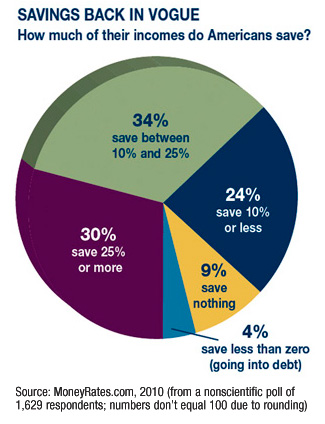The economy may be improving, but high unemployment and low inflation indicate that the Federal Reserve may keep interest rates low at least until 2012.1

Savings Accounts



Despite the pick-up in volatility at the end of January, risk assets continued their upward ascent throughout the month. Expectations surrounding the implementation of the newly passed tax reform bill and the weakening US dollar served as positive catalysts for the month.
With 39 percent of Americans feeling ill-prepared for retirement, according to the Employee Benefit Research Institute’s 2017 Retirement Confidence Survey, we are often challenged to come up with a solution to make saving easier.[1] Unfortunately, there are no easy solutions, and in the absence of u
In a widely anticipated move, the Fed increased interest rates by 25 basis points on March 15, 2017, the second interest rate hike in three months and there are talks of potentially two more raises this year.
Global events, such as the intensely divided presidential election that we just lived through, are certain to generate some periods of market volatility of varying lengths in addition to a significant amount of stress.
Maximizing tax credits offered by the IRS and various states around the US is key to maximizing your financial position. There are many types of tax credits available for both individuals and businesses.
There is no silver bullet when it comes to investing or wealth management in general… if there was, we would all be sitting on yachts and most likely not reading this article. However, there needs to be some clarity and calm on the very complex 'Brexit' subject for our US based clientele.
After an extremely volatile quarter, the broad equity market indexes ended just about where they started. Risk assets began the year under heavy pressure, with the S&P 500 Index declining more than -10% to a 22-month low on February 11.
Annuities are one of the few financial products that allow financial advisors to use the word "guaranteed".
On this week’s podcast (recorded February 26, 2016), Bill Miller, CIO from Brinker Capital discusses the recent string of positive news, the hopeful outcome following the G20 Summit, and what still remains as cause for concern:
What we like: G20 Summit underway to discuss new policies intended to h
You have 5 days left until Sunday January 31st to get health insurance for 2016.
If you miss this date, you may have to pay a penalty. Register now so that you don't miss the individual health insurance Obamacare Annual Enrollment Period (AEP).
After three years of strong market returns, 2015 performance was relatively flat combined with higher volatility across most asset classes.
The deadlines for Health Insurance are approaching fast. Get your plan by December 15th 2015 so that it is effective January 1st 2016. This will ensure you avoid paying any government penalties for not having health insurance in SC, NC and FL.
Having Health Insurance is the law, and getting covered in SC, NC, FL and GA is more affordable than you think.
Sunday November 1st 2015 marked the first day of the Annual Enrollment Period for health insurance plans commencing January 1st 2016.
You may have heard via the Charleston Business Regional Business Journal that the health insurance company Consumers Choice is closing.
The best thing you can do is register at www.MyHealthInsuranceUSA.com for a new plan as soon as possible.
A slowdown in China, which generated anxiety over the outlook for global growth, combined with the Federal Reserve’s decision to postpone the first interest rate hike, while warning of global developments, led to uncertainty and significant equity market volatility during the third quarter.
Dental and Vision Plans are generally low in cost, but are they actually worth purchasing? Usually the answer to these questions is that it completely depends on your personal circumstances.
If you are self-employed in Charleston SC, Charlotte NC, Atlanta GA or Miami FL, then it's likely you are already comparing ACA Obamacare Health Insurance Plans.
*Open Enrollment for Obamacare commences November 1st 2015
Choosing a health insurance plan in SC, NC, FL or GA isn’t a piece of cake.
Uncertainty over the start of the Federal Reserve’s rate hike campaign, the possibility of a default in Greece and Puerto Rico, and the drop in China shares each weighed on financial markets in June, resulting in a quarter of flat to negative performance across most asset classes.
Sitters, nannies and childcare centers are all necessary at some point for families. The cost of these services can gradually add up throughout the year if using them regularly.
Most people agree that two things are certain in life... death and taxes. If you live in the USA right now as a citizen or permanent resident, then you will have noticed that your tax liability has gradually been increasing on a yearly basis.
A 2014 IRS ruling makes it easier for taxpayers to move after-tax 401(k) contributions directly to a Roth IRA.